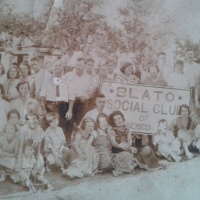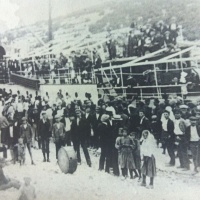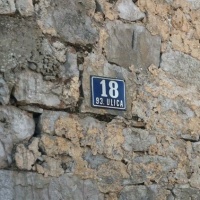e-migracija
Osobno iskustvo e-migracija od velikog je značaja danas za kulturu i politiku u RH. Pitanje dijaspore, s jedne strane, jedno je od najprijepornijih pitanja hrvatskog društva: tko su bili emigranti tzv. trećeg vala, 60ih godina? Kakva su bila njihova iskustva života u Jugoslaviji i što ih je prisililo da odu? Kako su ti e-migranti gradili suživot s e-migrantima tzv. drugog vala, onima koji su u Australiju došli nakon 2. svjetskog rata? Kako se Australija reprezentirala kako bi privukla radnu snagu, kakve temelje blagostanja je obećavala i kakav je bio imaginarij te reprezentacije?
S druge strane, što misli dijaspora o svom utjecaju na život u RH putem elektoralnog aparatusa?
To su neka od pitanja na koja kroz svoj rad odgovaraju Anita Bacic, australska umjetnica hrvatskog porijekla koja danas živi između Bangkoka i Tasmanije, gdje je rođena, stupajući u dijalog s drugim umjetnicima koji imaju osobno iskustvo ili se bave pitanjima migracije, i Sonja Leboš, kulturna antropologinja, rođena u Zagrebu gdje živi i radi, koja je zajedno s Darkom Fritzom mentorirala Anitin istraživački rad u Hrvatskoj tijekom 2015. godine u okviru djelovanja partnerske organizacije Siva zona, kada se Anita bavila egzodusom iz nekad najvećeg sela u JI Evropi, Blata na otoku Korčuli. Rezultati tog istraživanja su djelomično na Anitinom blogu.
U ovoj fazi istraživanja zanimaju nas odgovori na gore navedena pitanja. Istraživanja će se provoditi na Korčuli, u Zagrebu i u Sidneyu.
Ideja za budući projekt oslanja se na teorijsku pretpostavku Arjuna Appaduraia: današnju globalnu sliku svijeta uvjetuju masovni mediji i masovne migracije. Kada su migracije potaknute stravičnim ratom, a ne "samo" ekonomskim razlozima, emigrant je (Agambenovim rječnikom), 'uznemirujući element unutar uobičajenog poretka na osovini država-nacija'. U tom smislu, upravo figura prognanika, izbjeglice, 'naizgled marginalna figura' postaje 'centralna figura naše političke povijesti'. Neuralgično pitanje suvremenog hrvatskog društva o ulozi dijaspore u političkim određenjima zemlje kroz ovaj projekt komunicira s individualnim sudbinama ekonomskih migranata koji su svoj život na razne načine ostvarivali svjesni blizine političke emigracije iz doba neposredno nakon 2. svjetskog rata. Te dinamike suživota različitih oblika emigracijskih tokova bile su i jesu vrlo različite. Međutim, Appadurai upućuje na to da emigracijske populacije širom svijeta imaju snažan utjecaj na zemlje iz kojih su emigrirali. Znači, to nikako nije specifično samo za hrvatsko društvo. To je globalna dinamika.
Takve će teorijske postavke voditi tijek umjetničkog istraživanja koje će se u ovoj fazi koncentrirati na tri teme: 1) oblici reprezentacije "destinacije" Australije koji su se nudili evropskim ekonomskim migrantima 1960-ih (sve do kraja sedamdesetih australska država nosila se na razne načine s militantnim oblicima organiziranja esktremne desnice); 2) suživot raznih emigracijskih skupina i formati "prilagođavanja" i akulturacija; 3) oblici veza sa "starim" svijetom i načinom života. Istraživanje je većma potaknuto i pitanjem zašto su ljudi emigrirali na daleke kontinente iz Socijalističke republike Hrvatske 1960-ih godina, u vrijeme koje danas često (ili čak isključivo) intepretiramo kao vrijeme privrednog razvoja, općeg boljitka i naprednih formi društvenog uređenja. Odbacujući etnopsihološke teze s kraja 19. i početka 20. stoljeća o "pasivnim" narodima ili etničkim skupinama, ovim istraživanjem želimo zadrijeti u materijalističke (a time i marksističke) analize nemogućnosti tadašnjeg socijalističkog društva da na zadovoljavajući način redistribuira sredstva za proizvodnju kako bi svi članovi društva ostvarili pravo na rad, kruh i dostojan život. Kako je to pravo na rad, kruh i dostojan život "reklamirala" država u kojoj u to vrijeme 1960-ih godina još održava stravične rasističke zakone kojima vrši opresiju nad indigenim stanovništvom Australije, Aboridžinima? Kakve su poslove obavljali emigranti trećeg vala u Australiji, a kakve poslove su ostavljali iza sebe u Socijalističkoj republici Hrvatskoj? Kakva je bila nominalna razlika u primanjima i kakav vid kvalitete života je omogucavao rad u Australiji u odnosu na kvalitetu života u, recimo, glavnom gradu SRH, - Zagrebu? Sve su to pitanja koja uključuju pokretanje konkretnih kvalitativnih istraživanja, uz njihovu kontekstualizaciju unutar globalne geopolitičke slike svijeta i s pozicije razumijevanja potpunog zaokreta uloge dijaspore u hrvatskom društvu, od marginalnog spominjanja u literaturi i na filmu do njenog zamjetnog upliva u društvene, kulturne i
političke tokove u Hrvatskoj i Jugoistočnoj Evropi od 1980-ih do danas. Do sada su provedena brojna istraživanja i umjetnički projekti koji se bave fenomenom "gastarbajterstva" (u Beču je 2004. godine organizirana velika izložba pod naslovom Gastarbajteri, što znači da je eksplicitno govorila o emigraciji iz slavenskih zemalja JI Evrope), ali vrlo je malo istraživanja na temu dijaspore s polazištima koja nisu u konzervativnim narativima, te je isto tako vrlo malo umjetničkih projekata koji zadiru u pitanja dijaspore. U srži ovog umjetničkog istraživanja je pitanje političke, a time i ekonomske reprezentacije uvjeta rada i proizvodnje.
Pročitajte esej kustosice Sonje Leboš.






